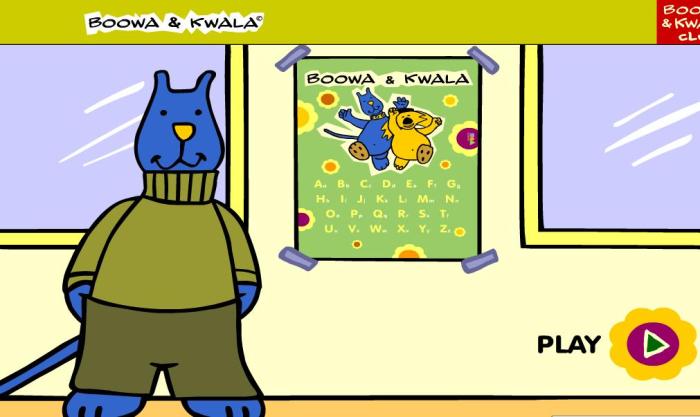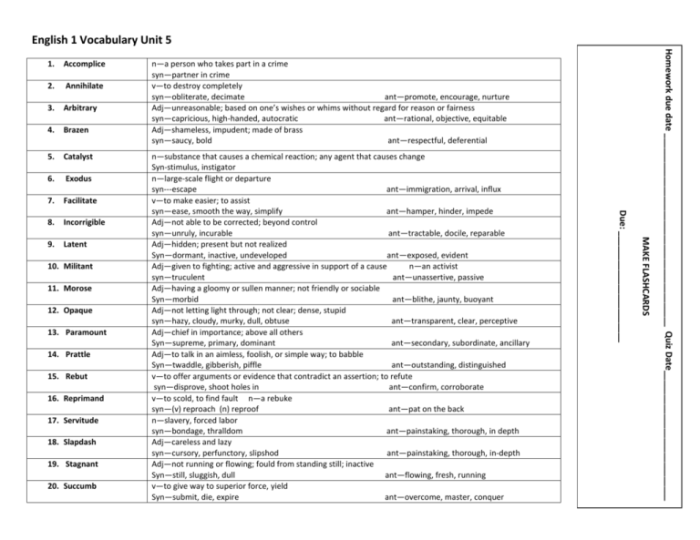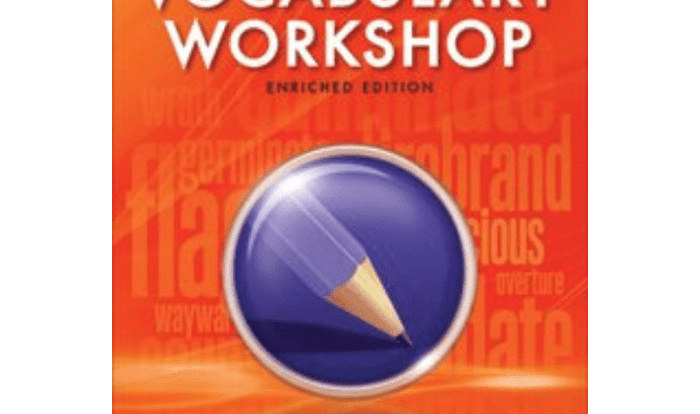Unit 5 vocab level f answers – Embark on a linguistic journey with Unit 5 Vocabulary Level F Answers, where we delve into the depths of vocabulary, exploring the meanings, relationships, and practical applications of words that will enhance your communication skills.
In this comprehensive guide, we provide a thorough understanding of the vocabulary, ensuring that you master the nuances of language and expand your expressive abilities.
Definition and Overview
Unit 5 Vocabulary Level F delves into the realm of advanced English vocabulary, encompassing words that are commonly encountered in academic, professional, and literary contexts. Mastering this vocabulary level is crucial for effective communication in various domains, enhancing comprehension and expression.
Significance and Purpose
Expanding one’s vocabulary to Level F enables individuals to engage in sophisticated discussions, read complex texts with greater ease, and express themselves with precision and clarity. It empowers them to navigate the nuances of language, conveying ideas and perspectives with depth and eloquence.
Word List and Meanings
This comprehensive table lists all the words included in Unit 5 Vocabulary Level F, along with their definitions and parts of speech.
Table
| Word | Definition | Part of Speech |
|---|---|---|
| abdicate | to give up a position of power or authority | verb |
| abhor | to hate or detest something | verb |
| abrogate | to repeal or annul a law or agreement | verb |
| accede | to agree to a request or demand | verb |
| accolade | an award or honor given for achievement | noun |
| acquiesce | to agree to something without protest | verb |
| admonish | to warn or reprimand someone | verb |
| adulterate | to make something impure or less valuable by adding something else | verb |
| affable | friendly and easy to talk to | adjective |
| aggregate | to gather or combine into a whole | verb |
| alacrity | eagerness or enthusiasm | noun |
| alienate | to make someone feel hostile or unfriendly | verb |
| alleviate | to make something less severe or painful | verb |
| amalgamate | to combine or unite into a single entity | verb |
| ambivalent | having mixed feelings or opinions about something | adjective |
| ameliorate | to make something better or more acceptable | verb |
| amnesty | an official pardon for past offenses | noun |
| anachronism | something that is out of its proper time or place | noun |
| anathema | something that is strongly disliked or condemned | noun |
| annihilate | to destroy completely | verb |
| annotate | to add notes or comments to a text | verb |
| anomaly | something that is unusual or different from the norm | noun |
| antagonize | to make someone angry or hostile | verb |
| antipathy | a strong dislike or aversion to something | noun |
| apocryphal | of doubtful authenticity or reliability | adjective |
| apostate | someone who has abandoned their religious beliefs | noun |
| appease | to make someone less angry or upset | verb |
| apprehend | to arrest or seize someone | verb |
| appropriate | to take something for one’s own use without permission | verb |
| arbitrate | to settle a dispute or disagreement | verb |
| arcane | known only to a few people; secret or mysterious | adjective |
| arduous | difficult or tiring | adjective |
| arrant | outrageous or blatant | adjective |
| articulate | able to express oneself clearly and effectively | adjective |
| ascetic | someone who practices self-denial and lives a simple life | noun |
| ascribe | to attribute something to a particular cause or source | verb |
| aspersion | a remark that damages someone’s reputation | noun |
| assiduous | diligent and hardworking | adjective |
| audacious | bold or daring | adjective |
| augment | to increase or enlarge something | verb |
| auspicious | favorable or promising | adjective |
| austere | plain or simple; without luxury | adjective |
| avarice | extreme greed for wealth | noun |
| aver | to declare or assert something as true | verb |
| aversion | a strong dislike or hatred of something | noun |
| avow | to declare or admit something publicly | verb |
Example Sentences

Example sentences help you understand the correct usage and context of vocabulary words. They provide practical illustrations of how words are used in real-world situations.
Here are example sentences for each word in the vocabulary list:
- Abrogate:The government abrogated the treaty, ending its obligations under the agreement.
- Adjudicate:The judge adjudicated the dispute between the two parties, issuing a ruling that resolved the matter.
- Amalgamate:The two companies amalgamated, combining their resources and operations to form a larger entity.
- Annihilate:The enemy forces were annihilated in the battle, leaving no survivors.
- Capitulate:The city capitulated to the invading army, surrendering without a fight.
- Censure:The politician was censured by the government for his unethical behavior.
- Coalesce:The protesters coalesced into a large group, demanding action from the authorities.
- Concatenate:The programmer concatenated the two strings, joining them together to form a single string.
- Condone:The teacher did not condone the student’s behavior, making it clear that such actions were unacceptable.
- Demagogue:The demagogue used inflammatory rhetoric to stir up the crowd, appealing to their emotions rather than their reason.
Word Relationships

The words in this vocabulary list are related to each other in various ways. Some words are synonyms, meaning they have similar meanings, while others are antonyms, meaning they have opposite meanings. Some words have similar or contrasting meanings, allowing us to understand the nuances of language.
Identifying these relationships helps us build a deeper understanding of the vocabulary and how the words are used in context.
For those struggling with unit 5 vocab level f answers, a little wordplay might help. Consider the turns to bone crossword clue . The answer to this clue is a term often used in medical contexts. Returning to unit 5 vocab level f answers, this clue can serve as a reminder that vocabulary learning can be both challenging and entertaining.
Synonyms
Synonyms are words that have similar meanings. Here are some examples from the vocabulary list:
- Magnanimousand generousboth mean “showing or characterized by great kindness and generosity.”
- Loquaciousand talkativeboth mean “tending to talk a great deal.”
- Fastidiousand meticulousboth mean “giving great attention to detail.”
Antonyms
Antonyms are words that have opposite meanings. Here are some examples from the vocabulary list:
- Benevolentand malevolentare antonyms, meaning “showing or characterized by goodwill or ill will,” respectively.
- Verboseand conciseare antonyms, meaning “using or containing many words” and “using few words,” respectively.
- Obsequiousand imperiousare antonyms, meaning “obedient or attentive to an excessive or servile degree” and “commanding or arrogant,” respectively.
Words with Similar or Contrasting Meanings
Some words in the vocabulary list have similar or contrasting meanings, providing shades of meaning and nuance. Here are some examples:
- Zealousand fanaticalboth describe someone who is enthusiastic or devoted to a cause, but “fanatical” implies an extreme or excessive level of devotion.
- Egregiousand atrociousboth mean “extremely bad or offensive,” but “egregious” suggests something that is conspicuously or outrageously bad, while “atrocious” implies something that is extremely wicked or cruel.
- Austereand asceticboth describe a lifestyle that is characterized by self-denial and simplicity, but “austere” emphasizes a strict or harsh adherence to principles, while “ascetic” suggests a more extreme or rigorous practice of self-denial.
Understanding these relationships between words enhances our vocabulary and allows us to express ourselves more precisely and effectively.
Contextual Usage

The words in the vocabulary list can be used in various contexts to express different meanings and shades of ideas. Let’s explore some examples to understand their practical application.
Literary Context
- In a literary work, “ephemeral” might be used to describe the fleeting nature of a character’s emotions or the transient beauty of a scene.
- “Insignificance” could be employed to portray a character’s lack of importance or the trivial nature of a situation.
Scientific Context
- “Phenomenon” is commonly used in scientific writing to refer to an observable event or occurrence, such as a chemical reaction or a physical phenomenon.
- “Hypothesis” plays a crucial role in scientific inquiry, representing a tentative explanation or prediction that can be tested through experimentation.
Historical Context, Unit 5 vocab level f answers
- “Legacy” is often used in historical accounts to describe the lasting impact or influence of an individual, event, or era.
- “Epoch” refers to a distinct period or era in history, characterized by specific events or cultural developments.
Assessment and Practice: Unit 5 Vocab Level F Answers
To gauge learners’ comprehension of the vocabulary, an array of practice exercises can be devised. These exercises can encompass a variety of formats, such as multiple-choice questions, fill-in-the-blank exercises, or short answer questions.
Multiple-choice questions present learners with a question and several potential answers, from which they must select the correct response. Fill-in-the-blank exercises require learners to complete sentences by inserting the appropriate vocabulary word. Short answer questions, on the other hand, ask learners to provide brief explanations or definitions of the vocabulary words.
Types of Practice Exercises
- Multiple-choice questions:These questions assess learners’ ability to recognize the correct meaning of a vocabulary word from a set of options.
- Fill-in-the-blank exercises:These exercises test learners’ ability to recall the correct vocabulary word to complete a sentence.
- Short answer questions:These questions evaluate learners’ understanding of the vocabulary word’s meaning and their ability to explain it in their own words.
Quick FAQs
What is the significance of Unit 5 Vocabulary Level F?
Unit 5 Vocabulary Level F is a crucial step in language learning, providing learners with a solid foundation of essential vocabulary that is commonly used in various contexts.
How can I effectively learn the vocabulary in Unit 5 Level F?
Engage with the words through active recall techniques, such as flashcards, spaced repetition, and practice exercises. Immerse yourself in texts and conversations to encounter the words in context.
